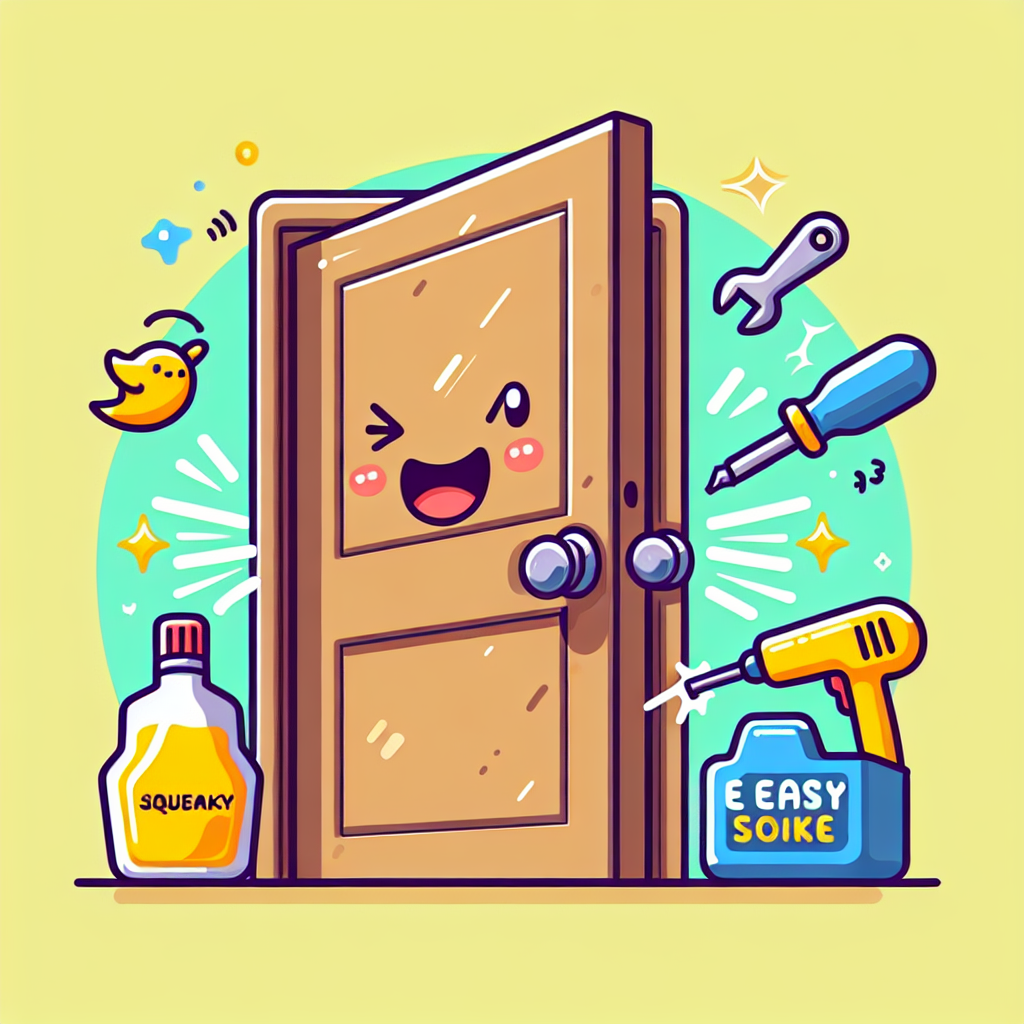The Persistent Problem of Squeaky Doors
We’ve all been there – trying to sneak out of the house early in the morning or slip into a room unnoticed, only to be betrayed by the telltale squeak of a door hinge. Squeaky doors are more than just a minor annoyance; they can disrupt sleep, break concentration, and even compromise your stealth missions. But fear not! This comprehensive guide will equip you with all the knowledge and techniques you need to silence those pesky squeaks once and for all.
Understanding the Cause of Squeaky Doors
Before we dive into the solutions, it’s essential to understand why doors squeak in the first place. The primary culprit is usually friction between the door’s moving parts, particularly the hinges. Over time, dust, dirt, and debris can accumulate in the hinge mechanism, while the lubricant that once kept things running smoothly dries out or wears away.
Other factors that can contribute to squeaky doors include:
• Loose hinge screws
• Misaligned door frames
• Warped wood
• Rusted hinges
• Temperature and humidity changes
By identifying the root cause of the squeak, you can choose the most effective solution and prevent the problem from recurring.
Essential Tools for Fixing Squeaky Doors
Before we get started with the various methods to fix squeaky doors, let’s gather the tools and materials you might need:
- Lubricants (WD-40, silicone spray, or petroleum jelly)
- Screwdriver (flathead and Phillips head)
- Hammer
- Pliers
- Steel wool or fine-grit sandpaper
- Clean rags
- Pencil
- Shims
- Wood filler
- Paint or wood stain (if needed)
Having these items on hand will ensure you’re prepared for any squeaky door situation you might encounter.
Quick Fixes for Squeaky Doors
Let’s start with some simple, quick fixes that often do the trick:
1. Lubricate the Hinges
The most common and straightforward solution is to apply lubricant to the hinge pins. Here’s how:
- Clean the hinge area with a dry cloth to remove any dust or debris.
- Apply a lubricant like WD-40 or silicone spray directly to the hinge pins.
- Open and close the door several times to work the lubricant into the mechanism.
- Wipe away any excess lubricant to prevent drips.
Pro tip: If you don’t have commercial lubricants on hand, petroleum jelly or even cooking oil can work in a pinch!
2. Tighten Loose Screws
Sometimes, the squeak is caused by loose hinge screws. To fix this:
- Inspect all the screws on the door hinges.
- Use a screwdriver to tighten any loose screws.
- If a screw won’t tighten, remove it and fill the hole with a wooden toothpick and wood glue before reinserting the screw.
3. Remove Built-up Dirt and Grime
If lubricant alone doesn’t solve the problem, try cleaning the hinge pins:
- Remove the hinge pin by tapping it upward with a hammer and nail.
- Clean the pin with steel wool or fine-grit sandpaper.
- Apply lubricant to the clean pin.
- Reinsert the pin and test the door.
Advanced Solutions for Persistent Squeaks
If the quick fixes don’t resolve the issue, it’s time to explore more advanced solutions:
1. Replace the Hinge Pins
Over time, hinge pins can become worn or bent, causing squeaks. Here’s how to replace them:
- Remove the old hinge pin as described earlier.
- Take the pin to a hardware store to find an exact replacement.
- Insert the new pin, applying lubricant as you do so.
- Test the door to ensure the squeak is gone.
2. Adjust the Door Alignment
Sometimes, a misaligned door can cause squeaking. To fix this:
- Close the door and observe any gaps between the door and the frame.
- If you notice uneven gaps, loosen the hinge screws slightly.
- Adjust the door’s position until the gaps are even.
- Retighten the screws and test the door.
3. Address Warped Wood
Wooden doors can warp due to humidity changes, causing squeaks. Here’s how to deal with this:
- Identify the warped area by closing the door and looking for gaps.
- Use a plane or sandpaper to shave down the high spots.
- If the door is severely warped, you may need to use shims to adjust its position within the frame.
Note: Severe warping may require professional intervention or door replacement.
Preventive Measures to Keep Doors Squeak-Free
An ounce of prevention is worth a pound of cure, especially when it comes to squeaky doors. Here are some tips to keep your doors running smoothly:
1. Regular Maintenance
- Lubricate hinges every 6-12 months, depending on usage.
- Clean hinges and surrounding areas regularly to prevent dust buildup.
- Check and tighten screws periodically.
2. Control Humidity
Fluctuations in humidity can cause wood to expand and contract, leading to squeaks. Use dehumidifiers or humidifiers to maintain consistent indoor humidity levels.
3. Choose the Right Lubricant
Different environments may require different types of lubricants:
- Dry environments: Use a dry lubricant like graphite powder.
- Humid environments: Opt for silicone-based lubricants.
- Outdoor doors: Use a weather-resistant lubricant.
4. Address Issues Promptly
Don’t ignore minor squeaks or stiffness in door movement. Addressing these issues early can prevent more significant problems down the line.
When to Call a Professional
While most squeaky door issues can be resolved with DIY methods, there are times when professional help might be necessary:
- If the door frame is severely warped or damaged
- When dealing with antique or valuable doors that require special care
- If you’ve tried multiple solutions and the squeak persists
- When the door’s structural integrity is compromised
A professional carpenter or door specialist can assess the situation and provide expert solutions to more complex problems.
Eco-Friendly Solutions for Squeaky Doors
For those who prefer natural or environmentally friendly options, consider these alternatives:
1. Beeswax
Melt beeswax and apply it to the hinge pins for a natural lubricant that’s effective and long-lasting.
2. Olive Oil
A small amount of olive oil can provide temporary relief from squeaks. However, it may need to be reapplied more frequently than other lubricants.
3. Coconut Oil
Similar to olive oil, coconut oil can be an effective natural lubricant. Its antimicrobial properties may also help prevent rust and corrosion.
Caution: While these natural options are eco-friendly, they may attract dust and dirt more readily than synthetic lubricants. Regular cleaning and reapplication may be necessary.
Innovative Tools for Squeaky Door Repair
As technology advances, new tools and products are emerging to make squeaky door repair easier and more effective:
1. Hinge Lubricating Pins
These specialized tools allow you to inject lubricant directly into the hinge mechanism without disassembling the door.
2. Dry Lubricant Sprays
These sprays leave a thin, dry film of lubricant that doesn’t attract dust and dirt like traditional oils.
3. Smart Home Sensors
Some advanced smart home systems can detect unusual sounds or movements in doors, alerting you to potential issues before they become noticeable squeaks.
The Impact of Door Material on Squeaking
Different door materials may require slightly different approaches to squeak prevention and repair:
Wooden Doors
Most susceptible to humidity-related issues and warping. Regular maintenance and proper humidity control are crucial.
Metal Doors
Less prone to warping but may develop rust in the hinges. Use rust-resistant lubricants and address any corrosion promptly.
Composite Doors
Generally more stable than wood but can still develop squeaks in the hinges. Regular lubrication is key.
Glass Doors
The frame and hinges are the primary concern. Ensure the glass is properly seated in the frame to prevent stress on the hinges.
Squeaky Doors in Commercial Settings
While this guide primarily focuses on residential doors, commercial settings present their own challenges:
- Higher traffic means more frequent maintenance is necessary.
- Fire doors may have specific requirements for lubricants and maintenance.
- Automatic doors require specialized care and may need professional servicing.
If you’re dealing with squeaky doors in a commercial environment, consult with a commercial door specialist for tailored advice and solutions.
The Psychology of Squeaky Doors
Believe it or not, the impact of squeaky doors goes beyond mere annoyance. Research has shown that persistent small noises like door squeaks can:
- Increase stress levels
- Reduce productivity in work environments
- Disrupt sleep patterns
- Contribute to noise pollution in urban areas
By addressing squeaky doors, you’re not just fixing a mechanical issue – you’re potentially improving the overall well-being of those in your home or workplace.
Conclusion
Squeaky doors may seem like a minor nuisance, but they can have a significant impact on our daily lives. From disrupting sleep to potentially increasing stress levels, these persistent noises are worth addressing. Fortunately, with the right knowledge and tools, most squeaky door issues can be resolved quickly and easily.
Remember, the key to squeak-free doors lies not just in fixing the problem when it occurs, but in regular maintenance and prevention. By incorporating simple checks and lubrication into your home maintenance routine, you can keep your doors operating smoothly and silently for years to come.
Whether you opt for quick fixes like applying lubricant, take on more advanced repairs like replacing hinge pins, or explore eco-friendly solutions, there’s a method that will work for your specific situation. And if all else fails, don’t hesitate to call in a professional for those particularly stubborn squeaks.
By following the advice in this guide, you’ll be well-equipped to tackle any squeaky door that comes your way, ensuring a quieter, more peaceful living or working environment. So go ahead, silence those squeaks, and enjoy the sweet sound of silence!
FAQs
Q: How often should I lubricate my door hinges?
A: For most residential doors, lubricating the hinges every 6-12 months should be sufficient. However, high-traffic doors or those exposed to harsh conditions may need more frequent attention.
Q: Can I use cooking oil to stop a door squeak?
A: While cooking oil can provide temporary relief, it’s not ideal for long-term use as it can become rancid and attract dirt. It’s better to use a proper lubricant designed for metal parts.
Q: My door still squeaks after I’ve lubricated the hinges. What should I do?
A: If lubrication doesn’t solve the problem, check for loose screws, misalignment, or warping. You may need to adjust the door’s position or replace the hinge pins.
Q: Is WD-40 the best lubricant for squeaky doors?
A: While WD-40 can work well, it’s primarily a solvent and may not provide long-lasting lubrication. Silicone-based lubricants or dry lubricants like graphite powder often work better for long-term results.
Q: Can humidity cause doors to squeak?
A: Yes, changes in humidity can cause wood to expand or contract, potentially leading to misalignment and squeaking. Maintaining consistent indoor humidity levels can help prevent this issue.
Q: Is it normal for new doors to squeak?
A: While less common, new doors can squeak due to tight-fitting parts or residual manufacturing oils. If the squeak persists after a few weeks of use, try lubricating the hinges.
Q: How do I fix a squeaky door without removing the pins?
A: You can try spraying lubricant directly onto the hinge while moving the door back and forth. Specialized hinge lubricating pins can also help you apply lubricant without disassembly.
Q: Are there any risks to using too much lubricant on door hinges?
A: Excessive lubricant can attract dust and dirt, potentially making the problem worse over time. Always wipe away excess lubricant after application.
Q: Can weather stripping cause door squeaks?
A: While not a common cause, worn or improperly installed weather stripping can create friction and noise. Check and replace weather stripping if it appears damaged or misaligned.
Q: How do I prevent my bedroom door from squeaking at night?
A: Regular lubrication is key. You can also try adjusting your opening technique – lifting the door slightly as you open it can reduce stress on the hinges and minimize noise.

